F L A U N T

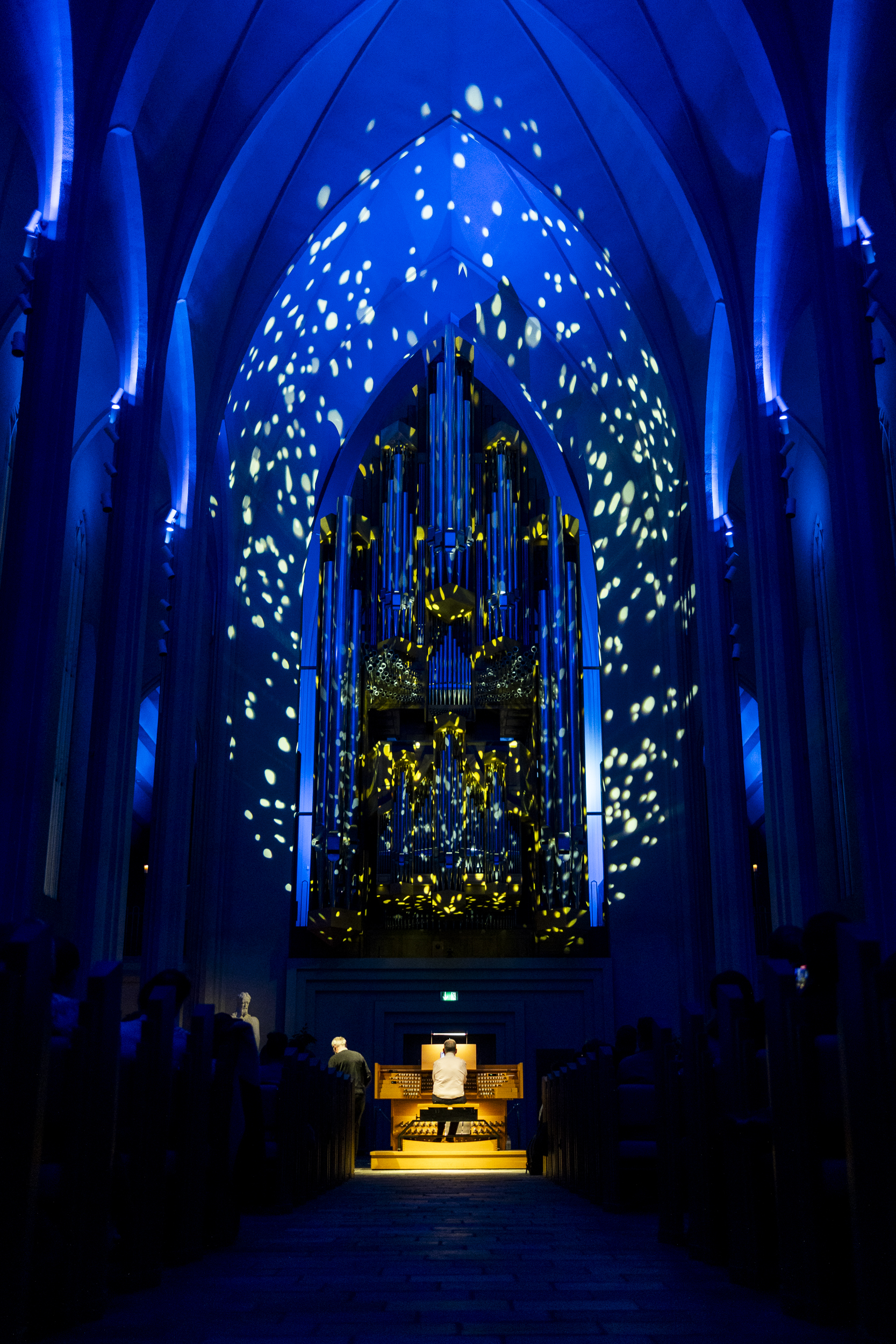
In early November in Reykjavík, Iceland, the day is in the ongoing process of curdling into night. Across from Reykjavík’s gentle downtown shorefront, the Esja mountain range punctures a still, bluey harbor water, illuminated by a threadbare Nordic light. It’s a mild day by Icelandic standards—last week’s snowbanks are transmogrifying into muddied puddles through which parents push prams of cherubic infants swaddled in linen, tourists are crowding themselves in incandescent pubs to eat lamb soup and reindeer bolognese, and polite white seabirds gather in clusters on the rocky cusp of the harbor. Save for the metal stanchions and flickering black flags outside of eight venues nestled into the heart of downtown, an impartial observer would not be able to discern the magnitude of what is to become one of the world’s greatest music festivals in the subsequent seventy-two hours.
But, if you’re in Iceland—where the population of 400,000 has taken government-mandated music education classes from a young age, where 108 artists from Iceland and from across the world have been flown by partner Icelandair to perform in venues across the city, where melodies leak from the cracks of the windows in coffee shops and bars and bookshops at all hours—you’re not an impartial observer. You can’t be. This weekend, under a pregnant pink moon, we’re all implicated in what will become the cultural phenomenon of Iceland Airwaves, and it all feels absolutely glorious.

Now in its twenty-sixth iteration, Iceland Airwaves serves multiple functions—part music festival, part international conference put on by partners Iceland Music, Reykjavík Music City and Business Iceland. During the day, experts and local parties are invited to community conversations on the past, present, and future of music, in participatory panels attended by the likes of Björk and the president of Iceland Halla Tómasdóttir. The festival’s artists commune in the aforementioned coffee shops, pubs, record shops, and bookstores (which, strangely enough, are often wrapped up into a singular entity, like Prikið or 12 Tónar), or even invite crowds into their own homes (Árni Hjörvar Árnason, bassist for The Vaccines and Marketing Manager at Iceland Music, throws an excellent house show). It is this sort of transcendent accessibility on behalf of all who participate in the Icelandic music scene that stretches the limits of an American visitor’s imagination and makes the weekend all the more unique. Iceland wants to be known, if you take the time to explore it.
In the coming days, crowds will filter through downtown to eight official venues—among them a Lutheran church, a self-service beer bar, a flea market, an art museum, and an old ballroom—but the visitor, if they’re lucky like myself, will also take the chance to explore the quotidian pleasures of Reykjavík and beyond: eating a Bæjarins Beztu Pylsur hot dog, taking a shot of Icelandic Cod Liver Oil at the Center Hotels breakfast buffet, holding hands with strangers at a live after hours cover band at bookstore Rúblan Bókakaffi, soaking in the (HIGHLY recommended) multitudinous local public pools, treating oneself to a champagne at the swim-up bar at the Sky Lagoon after a cold plunge. But even in these cases, hours or miles removed from the festival, music saturates.
After all, like Björk so eloquently surmised, it’s all an energy thing. A positive energy thing.
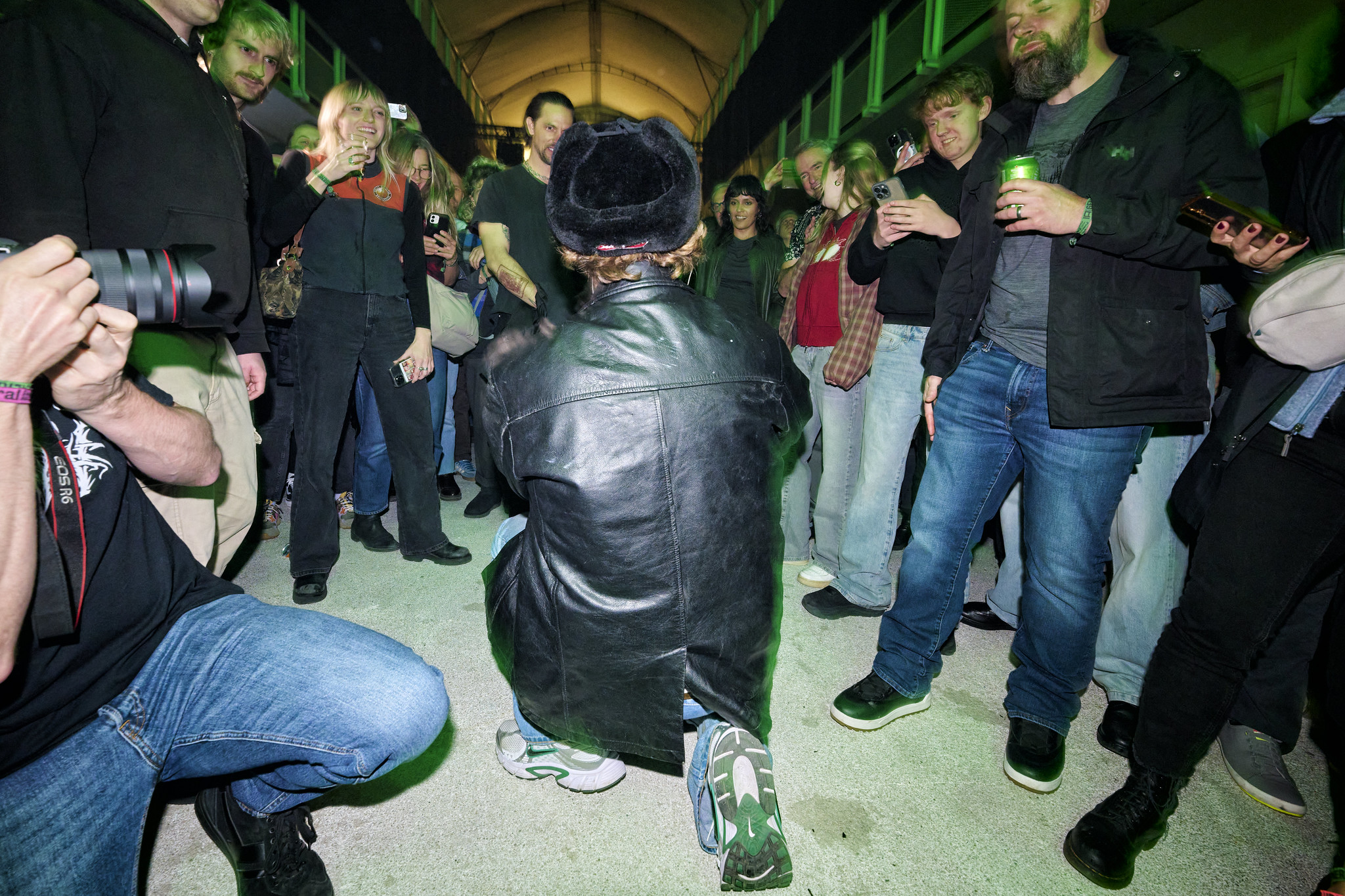
The Reykjavík Art Museum is a sandy looking structure emblazoned with angular graphic black lettering, located across a main thoroughfare (“Geirsgata”), from the glassy port. It is the largest collection of art in the country, and it is also the festival’s largest capacity venue: just past the foyer, the venue opens into a great hall with a two-story removable ceiling. It is where, at various points throughout the weekend, I will jostle against a throng of energetic teenagers in peacoats to see American internet phenom ian, and where Anthony Szmierek will jog through a parted crowd and gyrate his hips atop the soundboard, where Silvana Estrada will croon, fairy like, to an enchanted audience, and where, on Thursday night, South London band Fat Dog and Icelandic acts Valdimar, CYBER, and lúpína will begin the first official day of the festival, the stage curated by FLAUNT.
Reykjavík Art Museum houses a rotating exhibition program and a permanent collection of works by tastemaker of the European 1960s avant garde and epochal pop artist, Erró. The building’s uppermost levels, however, house something arguably more interesting—Hafnar Haus, a vibrant community of artists who rent (or purchase coworking memberships in) nooks and crannies of the multiple upper floors of the art museum for a cheap premium. The space boasts multivalent opportunities—there’s a podcast studio, a pottery room, a meditation room with breathtaking views of the mountain range above, and local artists take advantage: dining together, making zines, offering monthlong residencies to international artists seeking a fabulous view and a supportive community. I think about Hafnar Haus quite frequently when I’m enjoying a Heineken in the Art Museum crowd throughout the weekend. It’s quite tidy, I think to myself, incredulous. Idyllic, even, that I’m listening to music in this venue that’s also an art museum that’s also a creative space that nurtures creativity by making art financially accessible. That there is a world in which something like this can still exist and is not overtaken by corporate greed or selfishness gives me a sense of pleasure that makes the space seem brighter, warmer.
Anyway, it’s freezing by Angeleno standards outside the Art Museum and Hafnar Haus on Thursday afternoon where raucous drums from South London five-piece band Fat Dog’s soundcheck can be felt in the bones intermittently as the museum’s front door opens and shuts like a mouth, muffling and making loud a preview of what is to come. Chris Hughes, keyboardist and synth player of the notorious British punk band strolls up beside me, hat flopping over his eyes, to pronounce to me that punk, in 2025, is a scrawny ass scene.

It’s a characteristic admission for a member of Fat Dog, a group formed during the COVID lockdown and known for their ability to give cheek, make formidable noise, and deliver audiences a chaotic and fun live show. The band has played at stages across the world, delivering a sonic combination of new-wave electronica and good-old-fashioned, crunchy rock. This evening, Fat Dog will close out the stage. Hughes will leap into the crowd, his bandmate Joe Love will kneel on the sticky dance floor clutching a mic, and sweat will linger, miasmic, in the air, enveloping all who dare encroach the rambunctious pit in the characteristic Fat Dog live show euphoria. But for now, Hughes clutches his coat against the biting wind and keeps an out for errant pedestrians.
What are you expecting from the Icelandic crowd tonight?
From what I've heard, people in Iceland like heavy music. So I don't know. I think they should be a good crowd tonight. You've got to keep warm here, somehow. So I guess they'll be bouncing up and down a bit.
What do you want audiences to take away from your set?
Like, a fractured wrist or a broken ankle. No, just have fun with it. Just a memorable night of dancing.
If somebody could get to know Fat Dog through a song or an album that's not a Fat Dog song or album, what would it be?
“Tub Thumping” by Chumbawamba. [Singing, halfheartedly] “I get knocked down, but I get up again. Never gonna keep me down.” That accurately sums us up. And that's a song on repeat.
What does punk look like in 2025?
Scrawny, it's really scrawny. Punk used to have muscle. It's all gone now.
When you're looking for trouble, where do you go?
Punk gigs. Or a rough pub. I don't know—any pub, actually. I just run my mouth too much and then, and then shit goes wrong if I have too many. So, yeah, anywhere where there's booze.
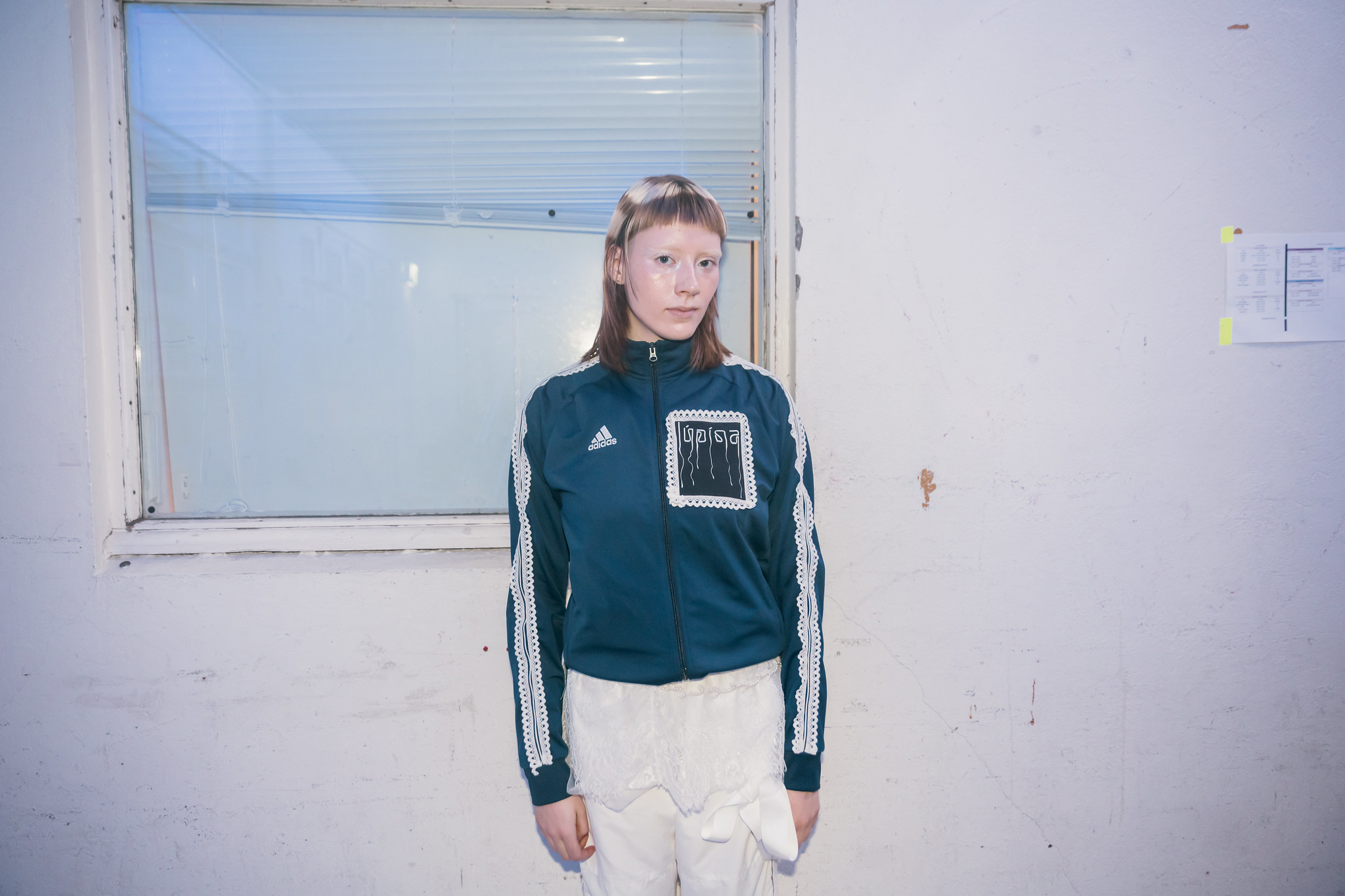
Throat warm between gulps of yellow-hued schnapps, the softspoken shopkeeper at downtown Reykjavík’s bespoke perfumery fischersund sprays copious amounts of perfume on thin strips of sample paper and instructs visitors to close their eyes to imagine an Icelandic summer. Between collective breaths, the gentle leader invokes a scene: brand new sneakers striking hot asphalt; sticky fingers coated in motor oil.
One can build from here—a sun that doesn’t graze the horizon; a vast unbroken field of the Icelandic lupine plant, blanketing the tops of the spindly midsummer grasses with a pale violet dust. A breathtaking scene, and one too, wrought with complexity—the lupine plant is a facet of Icelandic beauty that lures in tourists from across the world into remote valleys and fields, but it is also a species that has overtaken much of the natural biospheres. Miraculously beautiful. Choking.
Such absurd contradictions of the summer plant come to mind when listening to Icelandic artist lúpína. The songs overtake the senses—think lofty, spritely vocals looping over relentless drums, or phantasmagoric melodies over minimal strings. Hers is the soundtrack of the imagination, one that draws on electronic techno and traditional choir vocals to paint abstractions—colors, smells, sights, sounds in the mind, yielding this rich, strangely melancholic affect that feels unique to Iceland itself. She released her debut album, ringluð, in 2023, and her second, marglytta, in 2024. Her most popular single, “ástarbréf” (or “love letter” in English) toggles between modalities of lightness and weight, guiding the listener through gymnastic vocals and heavy synths.
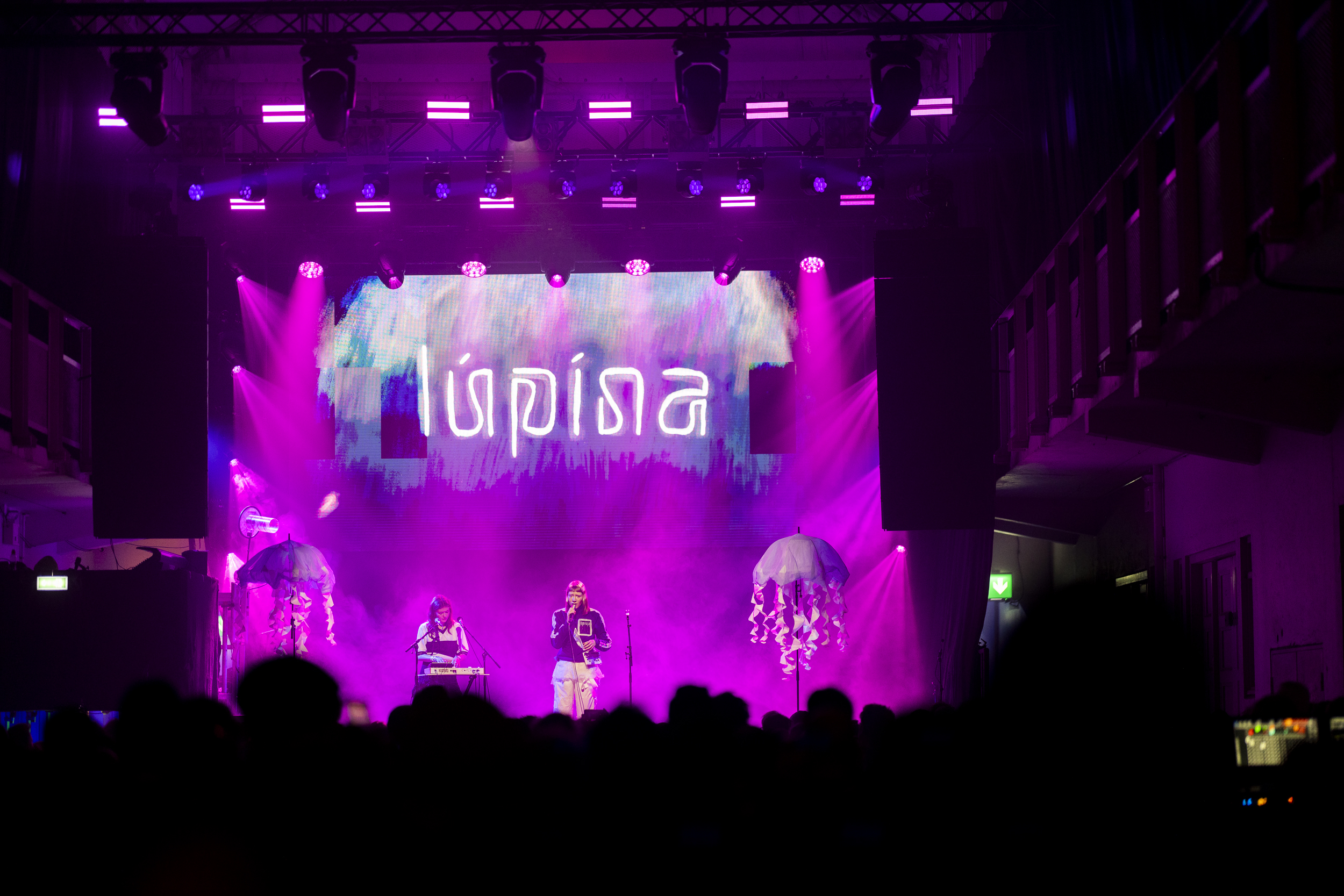
Lúpína’s speaking voice is sweet and decisive—delicate, like a kid gingerly skating atop a translucent frozen pond, as if something may erupt or shatter. Her live performance, though, proves that she can make things break: lúpína is radiant, bouncing on stage brandishing a keffiyeh thrown up from the audience, leaning over, through, away from the mic and asserting herself as a presence within the space, within the minds and ears and chests of her rapt audience. Listen to lúpína once and you will find yourself hearing her everywhere, in the sounds of the early morning traffic or on drunken walks home alone. lúpína’s power lies in her softness.
Your music has a very physical, ethereal feel to it. What part of the body do you feel music the most? And what part of the body does good music come from?
Good question I feel like I feel, yeah, my music comes mostly from my chest. I would say it's all really personal and it comes from the heart, but it's also something in the whole chest. When I sing, I often move a lot with my whole chest. I think it all begins there.
What do you want audiences to know about Iceland?
I think the best thing about Iceland is the swimming pools. I lived away from Iceland for four years, and always when I came here, the first thing I did was to go into the public pools. It's just one of a kind.
What does pop music mean to you, and how do you identify with a pop genre? And how do you feel like your music departs from it?
Pop music, for me, is just good music, catchy music, music that's somewhat accessible, but also within the frame of experimentation. I really like to challenge the boundaries of pop music and try to make something fun within that frame, and try to make it accessible but also interesting and something new and unique.
When you're looking for peace, where do you go?
I like to go for walks. I really like to walk by the ocean. And there's ocean everywhere here, so that's really accessible. But I also like to go to the pools.
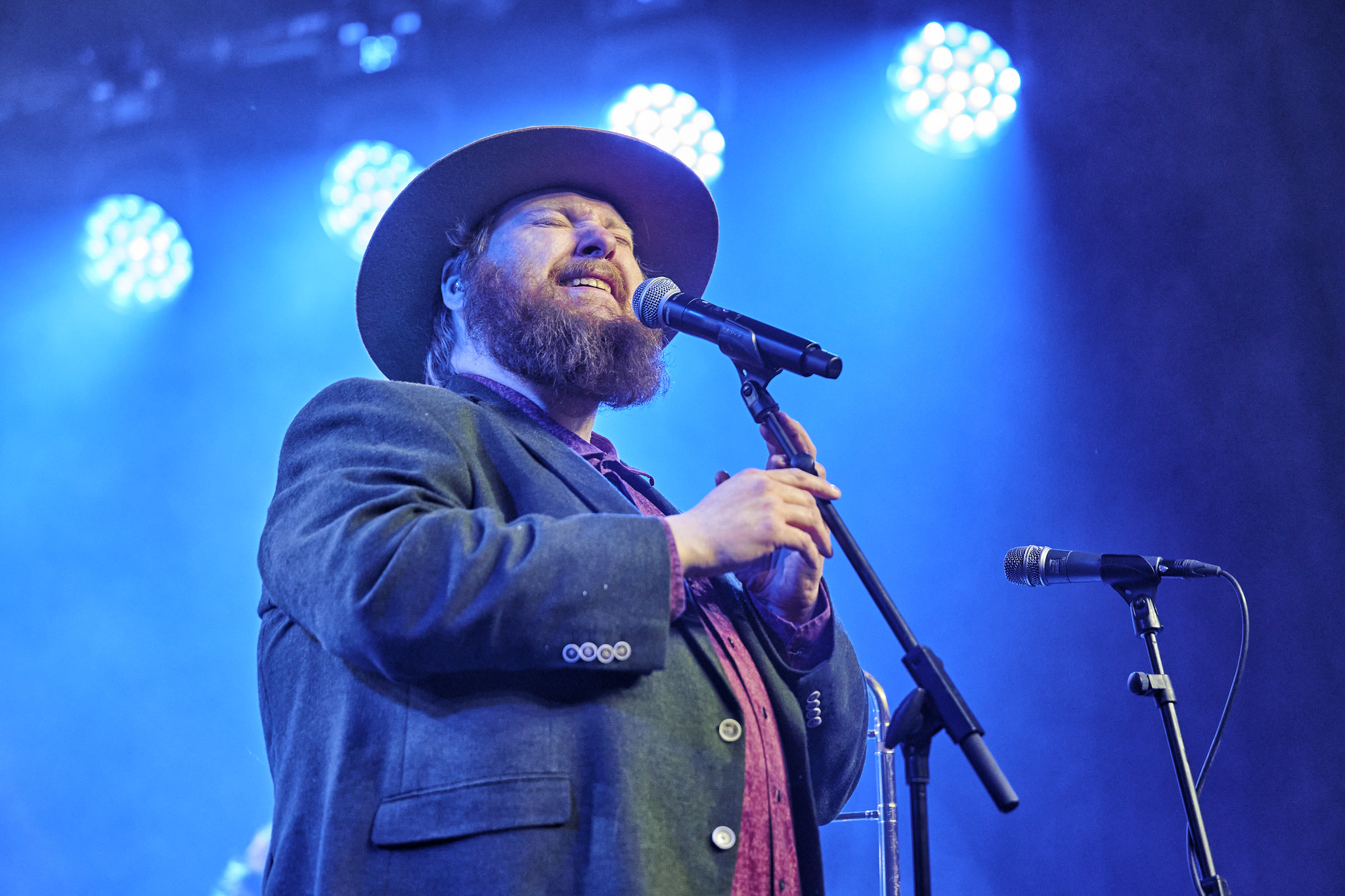
Valdimar knows how to maximize the joy in a late afternoon. This is evidenced as two of the band’s six members meander down the street to meet me, a cup of already cold black coffee cradled in flannel-clad arms, their shadows lengthening with each step. I am speaking with members of the Icelandic indie rock vanguard, who have watched firsthand as Iceland Airwaves blossomed from a local endeavor to an international festivity, and it is comparable to speaking with a treasured neighbor: Valdimar Guðmundsson and Ásgeir Aðalsteinsson are thoughtful and speak with intention, no trace of their decadeslong international success leaking into a conversation that inevitably ends up in a discussion of lucid dreams.
The band, arguably, deals in dreams: Valdimar released their first album, Undraland, in 2010—an immediate success, the single “Yfirgefinn” becoming one of the most played songs of 2011 in Iceland. Their sound, mired in a sort of twangy Americana that buoyed Arcade Fire in the States around the same period, is still demonstrably Icelandic, with experimental elements of electronic and noise woven through the grit. In the decade following the remarkable debut, Valdimar released four albums—all to critical acclaim. Now, the band’s frontman is immediately recognizable in the street, a mop of ginger hair thrust into a sweeping side part.
Tonight, the band will be enjoying yet another year at the festival—partly for their performance, which will see Guðmundsson helming a trombone and a crowd of fans new and old swaying in unison—but partly as festival regulars. In the waning light in the hours leading up to their show, Valdimar offers some veteran advice: forget about the queues. It will be fun when you get inside.
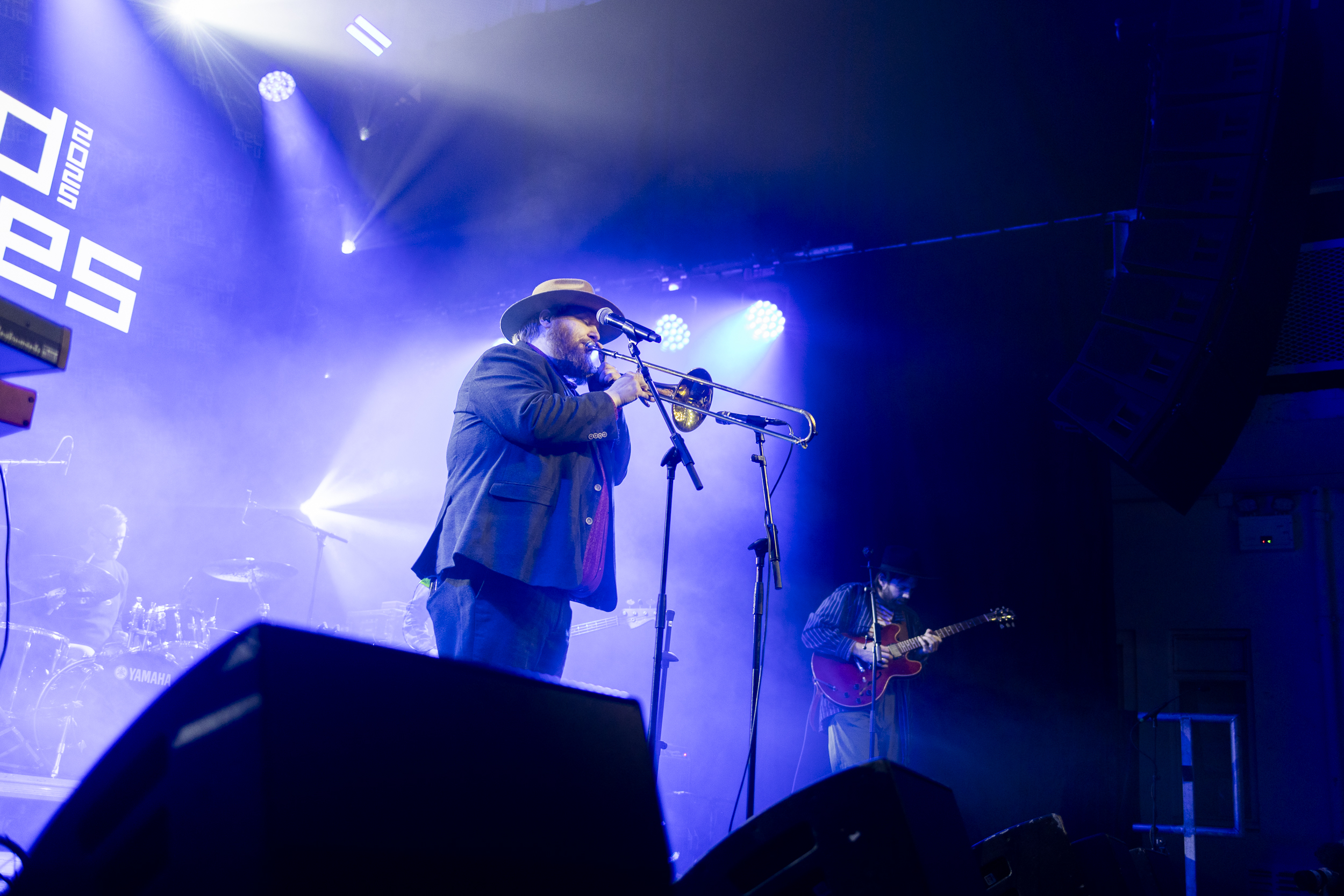
How have you seen the festival change over the past couple years?
Valdimar Guðmundsson: I feel like it started very, you know, was very like a local, like a grassroots thing in the beginning, and then it became a bigger thing and, and I think they're going back to the roots now.
What do you want people to remember about their time at the festival or your set this year?
Ásgeir Aðalsteinsson: Just want them to have fond, fond memories of good music. And yes, I think that's the point.
Guðmundsson: I think yeah, and forget about the queues. Remember that it will be fun when you get inside.
What are you listening to these days?
Guðmundsson: I've been really obsessed with Adriannne Lenker and Big Thief.
Where do you take inspiration from at this point in your career, and how has it changed since your first time?
Guðmundsson: Big Thief is a big inspiration now. As I get older, I'm getting more influenced by older musicians. Guys like Bob Dylan. I relate more to them than I did before.
When you're stuck in a rut, where's a good place to go?
Aðalsteinsson: Take a nap, just try to dream. It's really fun to have, like, a nap and dream something, and then, you know, realize you're in a dream and then control it. I've done that, and it's really fun.
Guðmundsson: Like lucid dreaming?
Aðalsteinsson: Lucid dreaming. Yeah. That was a weird answer, but I'm gonna, yeah, I'm sticking with it for you.
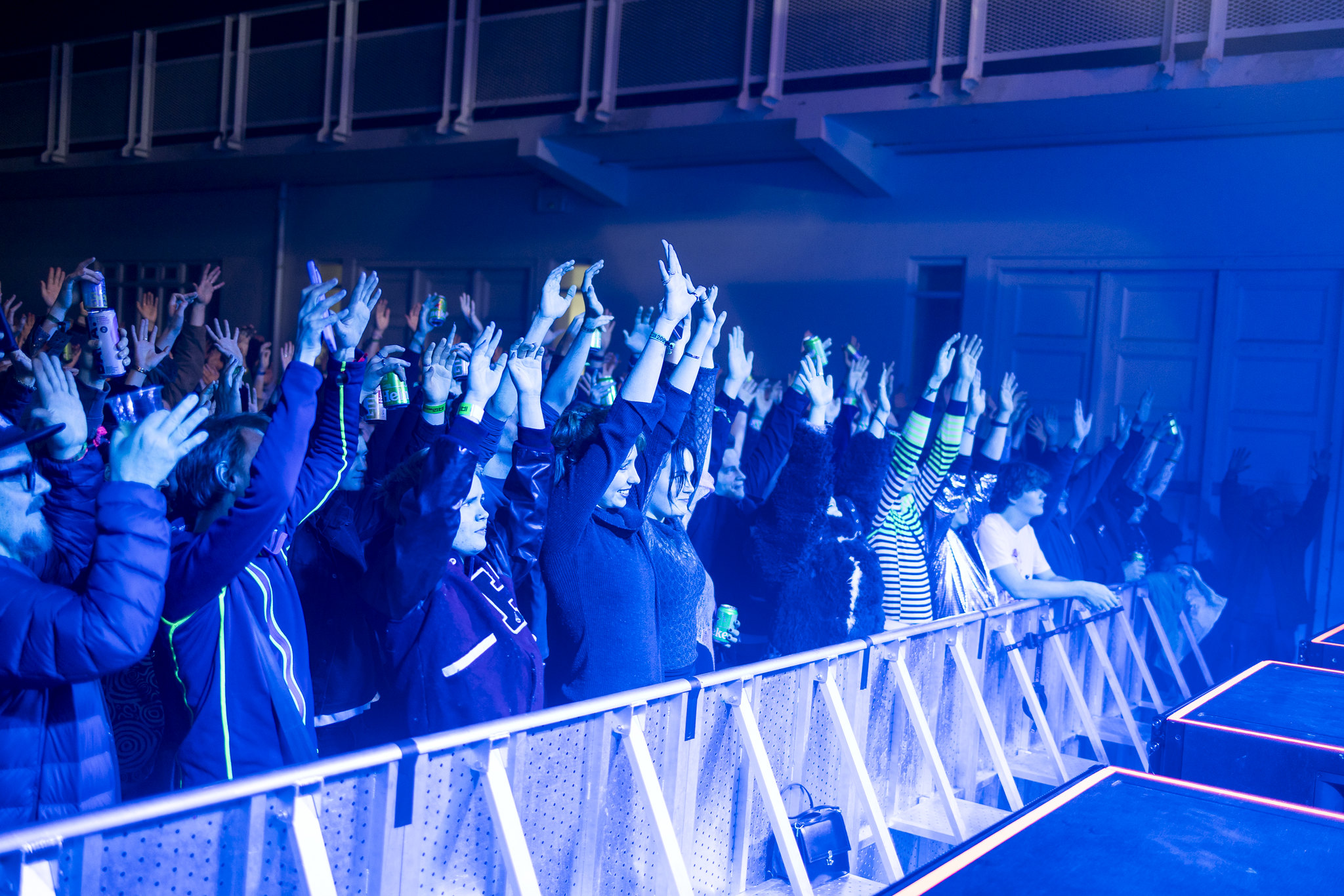
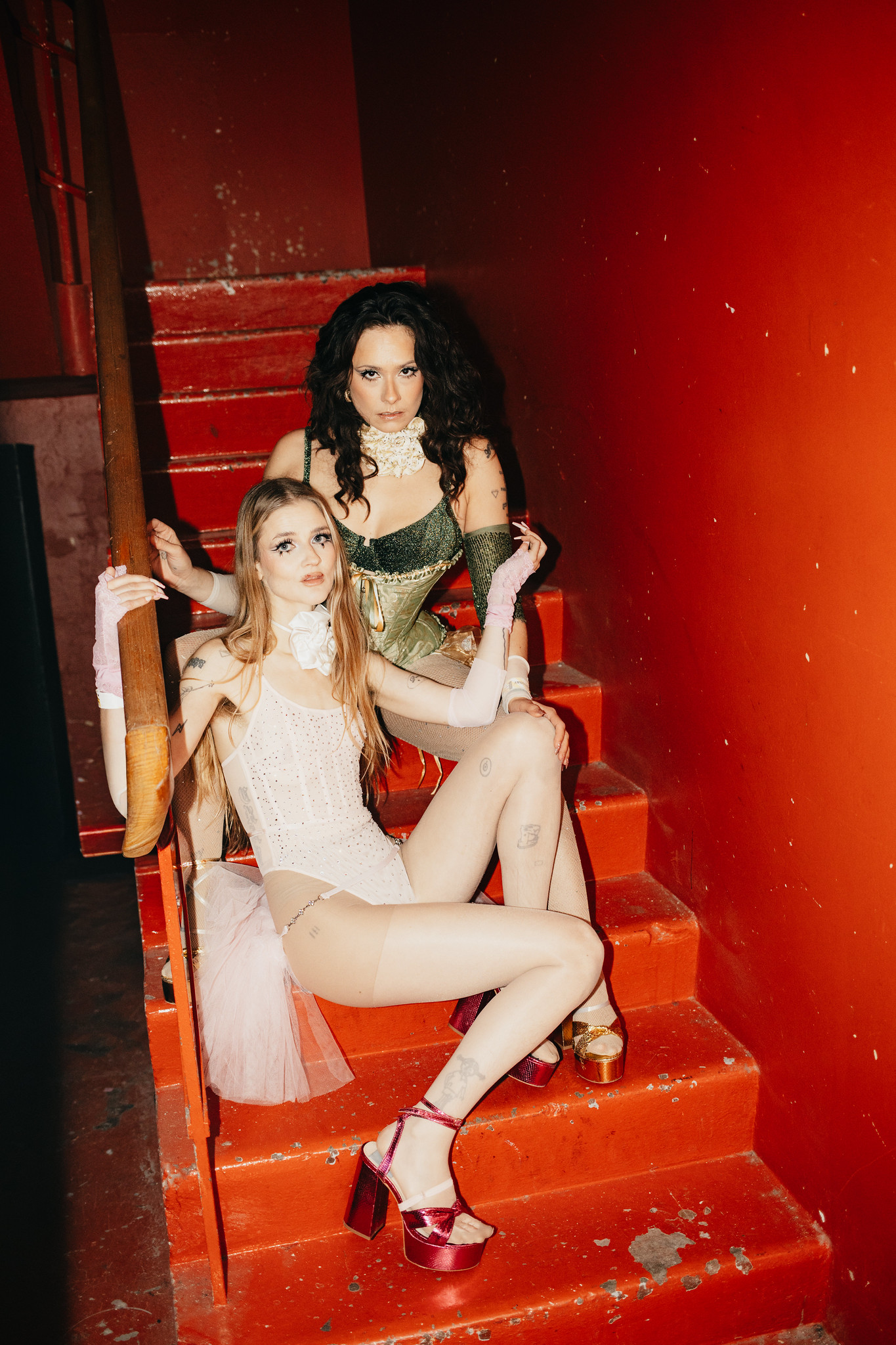
It’s a terrible band name for its near impossible searchability, but a damn good show. Joe Rakel and Salka Valsdóttir, two halves of experimental electronic duo CYBER, practically float from their supercharged performance to the back alley, meeting me mid-smoke to tell me as much. The duo have the kind of near-telepathic rapport that one can only expect from best friends of over a decade. It’s a joyous, theatrical dynamic that manifests in both a mesmerizing live show and a crackling, kinetic sound—Rakel and Valsdóttir have clearly figured something out.
After meeting in a high school bathroom and sharing a magenta MAC lipstick (shade: CYBER), Rakel and Valsdóttir became fast friends and creative partners, putting out a delectable blend of conceptual punk-rock-thrash-metal-disco. In the decade and a half that followed, CYBER has metamorphosed, at one point releasing rap music with an all-female rap collective called Reykjavíkurdætur, and eventually touring around Europe with Icelandic boyband HATARI—they’ve even opened for Sevdaliza and Migos. Their most recent project, 2024’s SAD :’( sees the two dabble in hyperpop, drum and bass, and R&B, a testament to the duo’s enduring creative flexibility.
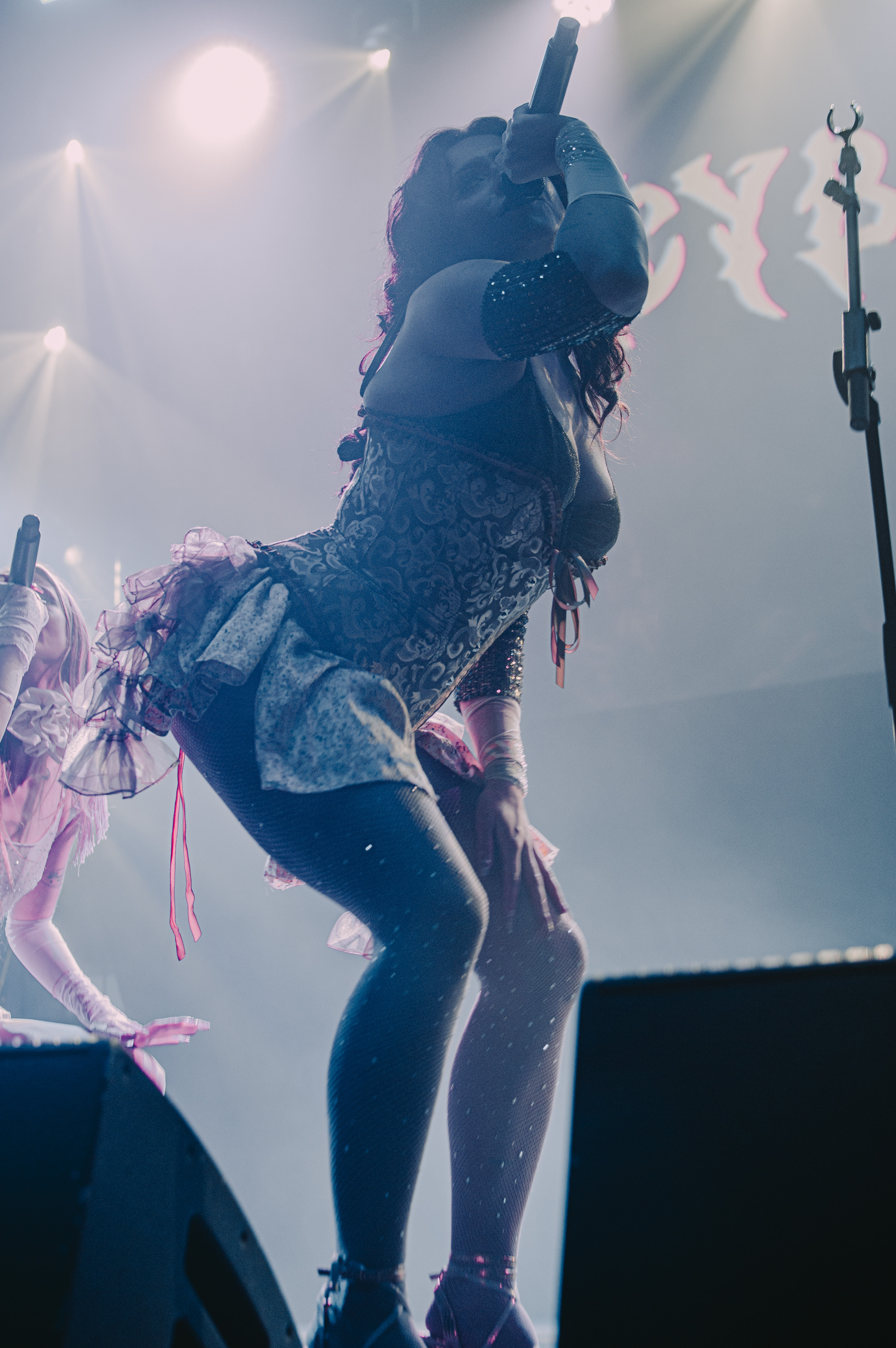
CYBER is signed to local record label Marvaða Creations—a burgeoning Iceland-based indie label who positions itself as a “creative nebula…like stars forming in a cosmic nursery.” Alongside CYBER, Marvaða nurtures numerous other standout acts throughout the festival, among them sensual Farao, electronic producer and titan-in-the-making knackered, and Valsdóttir’s operatic solo endeavor. The label—which is now opening a creative space with a robust soundsystem in Reykjavík ripe for techno parties—is known for both its distinct aesthetic curation and its commitment to uplifting femmes in the Iceland music scene, and, remarkably signing pregnant women (which, I am told, is rare even for the country’s progressive creative industry).
Rakel and Valsdóttir, with their boisterous mannerisms and easy grins, are certainly proof of cosmic-nursery concept. CYBER speaks in a vocabulary entirely their own, and God, if it meant we could have an inkling of the energy, don’t we all want to be fluent?
Can you tell us a little bit how you feel about your performance?
Joe Rakel: Our aspiration before going on stage was that we were, like, we had to be these, like, huge show girls that had been in a Vegas residency for like five years, and this was, like our anniversary show, yeah, like the day we're gonna do a little put a little extra pizzazz. That was our motivation, and I think we pulled that off.
What did you want people to take from your performance?
Rakel: I just want people to think I'm hot. That was mainly the goal, just to be sexy,
Salka Valsdóttir: You can be a little goofy, ditzy, and not like the best singer, and still kick ass on a big stage.
Rakel: I just want people to have fun. I felt I was gonna say something super intellectual, but then I forgot about it. Fuck that.
Can you tell me a little bit about how you two met and why you stayed together as a group?
Valsdóttir: We met in high school, and we both had the same lipstick, which was called Cyber, from Mac iconic shades that is, like a dark purple. It was like the 2013 color. We were like, “Oh my god, what a coincidence!” I think everyone had this lipstick, and we just didn't know. And so we thought that this was somehow destiny, telling us we had to be, like, form a group called CYBER, and so we did, and here we are.
Rakel: Of course, we spoke English, but I don't think we'd ever heard the word “Cyber” and we were like “Cool word, yeah. That should be a cool band name.’
Valsdóttir: We didn't anticipate how terrible of a band name it would be. Impossible to Google. We just thought it was like, this cool word that no one knew, except MAC Cosmetics.
How do you inspire the other to grow?
Rakel: You push me a lot. You're really determined. You really know what you want. And you keep asking me questions when [I do or don’t like] a sound. I have to think. You make me think, honey. You make my brain grow.
Valsdóttir: I aspire to have your boundaries. You're very good at being like, “This is too much. I need time off,” or just with other people as well. Like, someone will start talking to us. And [Rakel] is like, “No, we're having a conversation right now. You can go away.” And I'm like, “So sorry! Please stay!” You know? So that has taught me a lot.
When you need to dance, where do you go?
Salka: Reykjavík is terrible. It's a good, like, chatty… meeting people, having a nice vibe kind of city. But that being said—the Marvaða space. Our label’s headquarters— they have a sound system and are actually going to be putting on a bunch of cool techno shows. Obviously, that's going to be the best place to dance, the Marvaða headquarters.
What role does feminism play in the future of music and your music, specifically?
Rakel: All the roles. I mean, it's the foundation of the foundation, being an AFAB person. Us being able to do what we do on stage, and feel comfortable and empowered by it, and not, something way worse? Like, no fucking chance we could do this just a few years ago. Now we're just being sexy ass 30 year olds in bustiers. Thank God for feminism, because what the fuck like we you would not have witnessed this miracle that was the show earlier tonight if it wasn't for feminism.
%20%40Hallgri%CC%81mskirkja%20By%20Florian%20Trykowski.jpg)